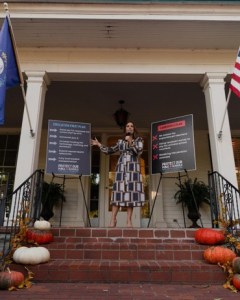Lt. Gov. Coleman goes on education tour
Published 3:42 pm Wednesday, October 4, 2023

- Lt. Gov. Jacqueline Coleman talks to a supporter at her second Protect Our Public Schools Tour stop the Western Kentucky Botanical Garden in Owensboro on Tuesday, Oct. 3, 2023.
Tuesday evening, Lt. Gov. Jacqueline Coleman continued her tour throughout Kentucky, sharing the Beshear-Coleman campaign’s education platform.

Lt. Gov. Jacqueline Coleman poses with supporters at her second Protect Our Public Schools Tour stop at the Western Kentucky Botanical Garden in Owensboro on Tuesday, Oct. 3, 2023.
Several dozen supporters gathered at the Western Kentucky Botanical Garden in Owensboro to hear her speak. Educators and non-educators alike wore stickers and held signs as they waited to talk to the lieutenant governor afterward.
Coleman, an educator herself, emphasized several key aspects of the campaign’s Education First plan, including:
- an 11% raise for all teachers and school staff in Kentucky public schools;
- universal pre-K;
- increased funding for technology, professional development training and textbooks;
- expanded mental health resources; and
- fully funded student transportation.

Lt. Gov. Jacqueline Coleman speaks to supporters at her second Protect Our Public Schools Tour stop at the Western Kentucky Botanical Garden in Owensboro on Tuesday, Oct. 3, 2023.
Makenze Cameron, wife of Republican challenger Daniel Cameron, has dismissed the 11% raise as “not feasible” at her own event sharing the Cameron campaign’s education plan.
State Budget Director John Hicks, however, has said that there are more than enough state funds to afford it, if the legislature agrees to include it in the upcoming biennial budget.
“Every single budget proposal we have sent to the legislature, we have included raises for teachers, and every single year it’s been taken out,” Coleman said.
“At some point, folks are gonna have to take their partisanship and set it to the side and recognize that in almost every county in Kentucky, the largest employer in their district is the public school system.”
Event attendees echoed this sentiment, including Lisa Baird, who served on the Henderson County school board for 12 years.
Baird said that she’s heard Cameron will support a school choice voucher program which would allow per pupil funding provided by the state and historically only available to public schools to move into private schools if students chose to attend them instead.
Coleman said the program would cause “irreparable harm” to public schools.
“So not only are we losing funding in our public schools—which they’re already underfunded—but those public tax dollars then end up in a private school that’s not accountable to the public the way that a public school is,” she said.
Baird agreed, saying that the program would be damaging in more rural parts of Kentucky.
“That may be fine in the big cities, but you can’t be doing it in our local farming communities,” Baird said.
” …They need every tax dollar that they can get their hands on to keep those schools running. These smaller districts, you can’t be pulling $100 away. You just can’t.”
School choice and private school vouchers are not included in Cameron’s official education platform, but he has expressed support for them on multiple occasions.
Homer Gray, a retired Breckinridge County teacher, was also mainly concerned about programs getting cut due to public school funding losses.

Lt. Gov. Jacqueline Coleman talks to retired educator Homer Gray at her second Protect Our Public Schools Tour stop at the Western Kentucky Botanical Garden in Owensboro on Tuesday, Oct. 3, 2023.
“If we lose funding for our schools and it goes to charter schools, then our school district is going to be decimated,” Gray said.
He added that achieving at least a high school education is more important than ever in today’s job market.
Coleman also framed education as the foundation of economic success.
“Understanding that the future of Kentucky’s economy is in our classrooms today changes the perspective of how you look at investing in education because that means you’re investing in economic development,” she said.
Cameron’s education platform focuses on learning loss during the pandemic, which he attributes in part to Beshear’s decision to shut down schools.
Baird said that characterization of the situation is false, and that Beshear himself did not shut down schools.
“That was an individual district decision,” she said. “Every district had the right to make that decision one way or the other. They may have given us the information and highly suggested that we do it, but they did not overlook the decisions that were made.”
One attendee, Marianne Smith Edge, said that Coleman addresses the “real issues” of Kentucky education.
“We have to have education for all and she really talks about the platform and brings that credibility,” Smith Edge said. “She’s been there; she is a teacher.”





